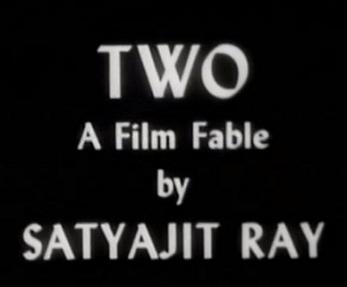ONE HEAD IS BETTER THAN TWO

This film is just a fable: a childish story for children, featuring children, and probably made by one. Serious people like you and I don’t need to pay it much heed. These are figments of a feeble imagination and bear no resemblance to the real world.
—
Budu is a sweet, cherubic child. He has many toys and each of them he lovingly plays with. He has just celebrated a birthday, it seems, and his treasure trove has grown. On his head he wears toy-ears like some unnamed cartoon mouse, and drinks a fizzy drink from an unbranded cola bottle. With his building blocks he builds towers that seem to touch the sky. He also likes the sound of balloons bursting. He lights matches to create these little explosions. Nothing dangerous, just child’s play.
Budu’s world is a content and happy place where he controls toys based on his own beneficent free will. These toys won’t operate themselves will they? He has to demand them, name them, collect them – it’s his manifest destiny to do so.
When a scamp of a boy outside the walls of his estate starts to make noise with his few toys, it sounds like a call to action. After all, that scamp (which is what I have to keep calling him because he isn’t thoughtful enough to wear a cap with his name on it) knows Budu is inside and that his antics are shattering the peace inside that palatial home.
Thus begins their play date. For every toy the scamp brings out Budu is forced to respond with better, noisier toys. It’s not that he wants to, but some fitting response is warranted, otherwise how will this game play out?
Among the costumes Budu has is one of a cowboy, one of an Indian (dot, not feather). He doesn’t feel it’s fair to play just one side when playing both sides can be such fun. He also has a mask lying around (of someone who looks real tricky but is probably just doing his best to keep things clean). Fortunately he doesn’t have to resort to that or things could get ugly.
Just as Budu thinks he’s leader of the free-wheeling world once again, he spots an aerial affront – a kite. That’s not fair, these were supposed to be gentlemanly games between boys. Seems like the big guns are called for. One clean shot through the heart, I mean the kite, and things can be peaceful once again. Once again the robot can march down the hallway. Once again there is only one source of sound, and things are in order.
But wait, what’s that? That flute. That blasted flute! After all the effort they went through, things are back where they began. The band plays on.
Why can’t the scamp understand that to play means having better toys and letting the one with the best toys decide the rules? Budu is a kind soul who wants all children like him to have toys like he has. They can buy some from him, I’m sure he’ll share. Anything’s possible if you just don’t keep playing that flute in front of the dandy doodle. Can’t you see how much it torments him when the harmony of the world is broken?
The unseen oil lubricating the smooth conduct of this game are some energy fairies. They give Budu and other children the shot of glucose that they need to play for a long time. And what’s more delicious than that energy, you ask? The fact that they paid for this game.
In the end, ask yourself – isn’t life much better being a Budu? I mean, why would you willingly give up the luxury within those high walls and live like the scamp? Sure, the scamp looks happy at first, but that’s only because he doesn’t fully know how poor and dirty he is. By the end of the game he knows how little his useless parents have provided him.
Once he gets to know there’s no cap on his head, he’ll come around. After all, which kid wants to be capless in a world with infinite varieties of caps? Why, that’s not fair. Fairness must be restored. Children need caps, and colas, and robots, and blocks, and guns, and balloons, and matches, and energy, and democracy, I mean freedom.